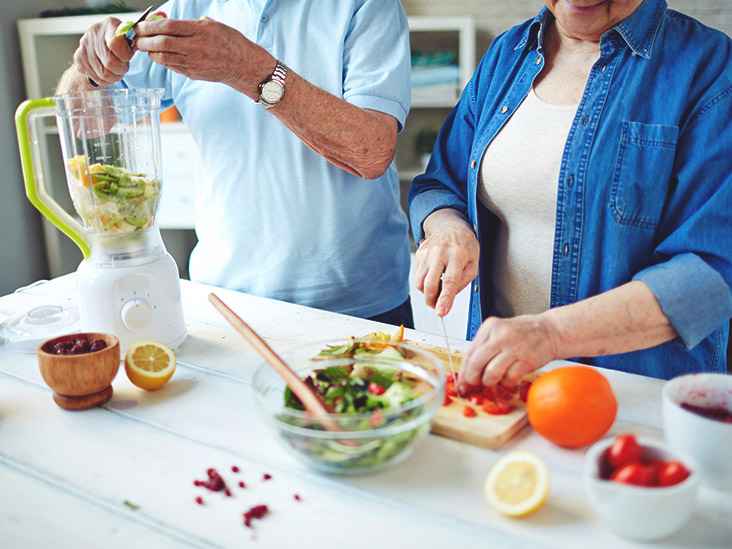Most of the wellness issues prevalent in the senior age group begin due to prolonged unhealthy behavior such as physical inactivity, poor diet, and smoking. Unfortunately, most of these issues are irreversible, and their side effects can only be maintained by prescribed medication. However, this is not a reason for anyone to panic. Moving forward, your sole responsibility should be intentionally taking control of your health and adjusting your lifestyle choices accordingly. The home helpers providing home care to seniors can help seniors take steps to achieve this by encouraging them to use these tips:

1. Engage In Physical Activity
Physical activity is often a struggle for many people due to the consistency and discipline required to get the full benefits. The truth is, exercise helps one build mental strength towards making positive life changes in our daily lives. It also helps build the immunity necessary to fight illnesses, keep your weight in check, and maintain independence for a long time, even in old age. Talk to a professional to guide you on moderate workouts you can incorporate into your week.
2. Eat Fiber-Rich Foods
As we age, our metabolism tends to stall, leading to constipation. For this reason, fiber-rich foods are essential to promote proper digestion, lower cholesterol levels, control blood glucose levels and help lower the chances of some cancer types. Some of the most common fiber-rich foods include:
- Fruits and vegetables
- Whole Grain bread, pasta, and cereal
- Brown rice
- Nuts and seeds
3. Vary Protein Intake
As you advance in age, the body tends to lose muscle mass and strength. Therefore, it is necessary to vary protein sources to preserve muscle mass. A healthy protein intake helps in weight management and cardiovascular functions and enhances strength and balance.
Along with the other daily dietary measures, ensure that you add these protein-rich sources; beans, nuts, fish, seafood, nuts, seeds, and peas. Ensure that you have at least one source of protein in your diet from breakfast, lunch, and dinner.
4. Add Minerals and Vitamins to Your Diet
Minerals and vitamins are some of the vital nutrients that the body needs to remain healthy. Essentially, they help to boost immunity, enhance strong bones, regulate hormones, and help heal wounds faster. However, one must be cautious not to take them in large amounts since they can be toxic.
Common vitamins include thiamine, riboflavin, niacin, biotin, and folate, essentially Vitamins A, B, C, D, E, and K. The minerals are calcium, potassium, magnesium, iodine, and fluoride. Some doctors may also opt that you get some of those inform of dietary supplements. However, if you want to include them in your daily diet, you can get them in:
- Green leafy vegetables
- Citrus Fruits- Grapefruits and oranges
- Nuts and seeds
- Wholegrains
- Fish
- Legumes
- Cereals
5. Drink Enough Fluids
Did you know that the sense of thirst diminishes with age? You should be conscious of how you are feeling and not wait until you feel dehydrated for you to drink water. A water bottle will help you stay on track with your water intake progress as you can move around with it and consistently drink small amounts of water daily. Besides, water will also help your digestive system and prevent constipation.
It is also necessary to lower the amount of caffeine intake, especially the most common tea, and coffee since they can lead to anxiety, stomach upsets, insomnia, and heart palpitations. Most of those symptoms listed above are also signs of dehydration which should be a call for concern.
6. Reduce Salt Intake
It is expected for your sense of smell and taste to change as you age. You may be inclined to use more salt than ever before. First, you should be cautious when buying processed foods and opt for those with low sodium levels or sodium-free.
As you make your homemade meals, opt for alternative fresh flavor ingredients like pepper, spices, herbs, and healthy oils, instead of salt. If you have felt a distinctive change in your taste buds since you started taking some types of medication, it would be necessary to talk to your doctor about it.
Everyone can make a turnaround in their lifestyle choices as long as they make a conscious decision. Do not beat yourself up for the lost years but focus on the future and make the health turnaround you wish to see.
About the Author
Jenn Walker is a freelance writer, blogger, dog-enthusiast, and avid beachgoer operating out of Southern New Jersey.




